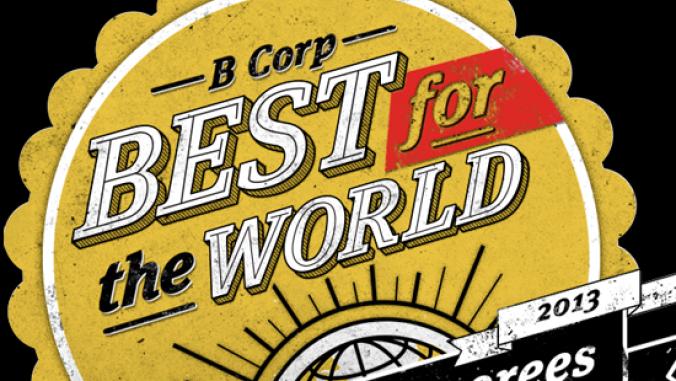Grading Sustainability Reports: Creating the Curve
As more and more companies publish sustainability reports, awards and studies of these reports help raise reporting standards. <br>
As more and more companies publish sustainability reports, awards and studies of these reports help raise reporting standards.
Over the past six years, entries into the Ceres-ACCA North American Awards for Sustainability Reporting have grown five-fold from 20 in its first year to 102 this year. This increase reflects the significant growth in companies publishing sustainability reports. With the increased calls from consumers, shareholders, and other stakeholders for greater corporate transparency and the Global Reporting Initiative (GRI) publishing the third version of its Sustainability Reporting Guidelines in 2006, more companies from all sectors are creating these reports to explain and document their economic, environmental, and social performance.
Ceres, a Boston-based coalition, and the U.K.-based Association of Chartered Certified Accountants (ACCA) announced the North American Sustainability Awards at the annual Ceres conference on April 25th. Vancity Group, Bristol-Myers Squibb, Green Mountain Coffee Roasters and Mountain Equipment Co-op took home the top awards. The Ceres-ACCA North American Awards recognizes top reporting on corporate sustainability issues and helps companies that are publishing sustainability reports.
Besides the sheer increase in the number of companies writing sustainability reports and entering the Ceres-ACCA Awards, Ceres points to the increase in comprehensiveness and the quality of information provided. "In the early days, most reports were either exclusively environmental in focus, on the one hand, or essentially foundation or philanthropy reports, on the other," reported Brooke Barton, Manager, Corporate Accountability at Ceres.
Barton said, "Today, more than 80 percent of the submissions are full-blown sustainability reports referencing the Global Reporting Initiative (GRI) and providing triple bottom line -- social, environmental and economic -- disclosure. This marks a sea change in the way companies are approaching sustainability. More and more, they are managing, measuring, and reporting on their sustainability performance in an integrated fashion that reflects the truly interconnected nature of these issues."
A panel of 14 judges evaluates companies' reports on the basis of three criteria: comprehensiveness, credibility, and communication. Ceres and ACCA also presented their "Report of the Judges," [PDF] which highlights the strengths and weaknesses in sustainability reports. Some of the areas that still need work include inadequate disclosure by companies on climate risk, product responsibility and lobbying activities.
Green Mountain Coffee Roasters (GMCR), headquartered in Waterbury, Vt., shared the award for Best First-Time Sustainability Report with Mountain Equipment Co-op, Vancouver, BC.
"We are honored and humbled by the recognition," stated Michael Dupee, Vice President, Corporate Social Responsibility at GMCR. "Our top priority was to provide a full and complete picture of who we are as an organization -- our history, our programs, and our goals -- as a guide to help all our stakeholders and us move together towards a more sustainable and productive future."
The GMCR report was written with a wide audience of consumers, employees, shareholders, stakeholders, and students in mind. The Ceres-ACCA Award pointed out that GMCR's report included employee compensation.
Dupee explained: "We designed our report to address four core areas of impact: coffee sourcing, community outreach, environmental affairs, and our workplace. Compensation is a key component of the quality of a workplace and we have a leading edge policy in place regarding livable wage. We believed that a discussion of our approach to compensation would be relevant and interesting to all readers."
Almost half (49) of the U.S. companies in the S&P 100 Index now disclose information above and beyond the financial, covering companies' environmental, social, and governance issues, according to the Social Investment Research Analysts Network (SIRAN) and KLD Research & Analytics (KLD), who released their annual study on sustainability reporting at the April Ceres Conference. Thirty-eight of the S&P 100 Index are using the GRI’s Sustainability Reporting Guidelines.
This study was inaugurated in 2005 by a coalition of about 10 analysts from SIRAN. In 2006, KLD assumed responsibility for the research, using sustainability report databases organized by Corporate Register and the Global Reporting Initiative, as well as the websites and the actual reports published by the companies included in the S&P 100 Index. Their hope is to find comparable data across companies to identify which companies were leading in transparency and which are lagging behind their peers.
"Sustainability reports can provide a glimpse of how a company sees itself," explained Katy Chapdelaine, a research analyst at KLD. "However, to provide investors with a full perspective on company performance, analysts at KLD utilize a range of sources outside of company publications, including press coverage, government data, and information from non-governmental organizations."
"Now, just under half of the widely watched companies in the S&P 100 issued sustainability reports in 2006. By next year, I expect a majority of the S&P 100 will be doing so, and increasingly sustainability reporting will be the norm and not reporting will be the exception," said Steve Lippman, Vice President of Asset Research at Trillium Asset Management, who worked with KLD to develop this year's study.
"There's a range of quality and credibility to current reporting," Lippman said. "Third party verification can help, as can a good faith effort to use GRI indicators and, more importantly, to meet important GRI reporting principles like balance and completeness in reporting. So this year's fluff piece from a first-time reporter can turn into a very substantial and useful report a few years down the line after companies have responded to stakeholder feedback and improved their reporting."
WestLB, a Düsseldorf-based bank, also presented its most recent findings at the Ceres Conference, entitled "GRI reporting -- Aiming to uncover the true performance." This study points to the sharp differences between the reporting efforts of companies and the challenges of drawing conclusions between a company’s report quality and the actual sustainability performance of the company.
Over the past six years, entries into the Ceres-ACCA North American Awards for Sustainability Reporting have grown five-fold from 20 in its first year to 102 this year. This increase reflects the significant growth in companies publishing sustainability reports. With the increased calls from consumers, shareholders, and other stakeholders for greater corporate transparency and the Global Reporting Initiative (GRI) publishing the third version of its Sustainability Reporting Guidelines in 2006, more companies from all sectors are creating these reports to explain and document their economic, environmental, and social performance.
Ceres, a Boston-based coalition, and the U.K.-based Association of Chartered Certified Accountants (ACCA) announced the North American Sustainability Awards at the annual Ceres conference on April 25th. Vancity Group, Bristol-Myers Squibb, Green Mountain Coffee Roasters and Mountain Equipment Co-op took home the top awards. The Ceres-ACCA North American Awards recognizes top reporting on corporate sustainability issues and helps companies that are publishing sustainability reports.
Besides the sheer increase in the number of companies writing sustainability reports and entering the Ceres-ACCA Awards, Ceres points to the increase in comprehensiveness and the quality of information provided. "In the early days, most reports were either exclusively environmental in focus, on the one hand, or essentially foundation or philanthropy reports, on the other," reported Brooke Barton, Manager, Corporate Accountability at Ceres.
Barton said, "Today, more than 80 percent of the submissions are full-blown sustainability reports referencing the Global Reporting Initiative (GRI) and providing triple bottom line -- social, environmental and economic -- disclosure. This marks a sea change in the way companies are approaching sustainability. More and more, they are managing, measuring, and reporting on their sustainability performance in an integrated fashion that reflects the truly interconnected nature of these issues."
A panel of 14 judges evaluates companies' reports on the basis of three criteria: comprehensiveness, credibility, and communication. Ceres and ACCA also presented their "Report of the Judges," [PDF] which highlights the strengths and weaknesses in sustainability reports. Some of the areas that still need work include inadequate disclosure by companies on climate risk, product responsibility and lobbying activities.
Green Mountain Coffee Roasters (GMCR), headquartered in Waterbury, Vt., shared the award for Best First-Time Sustainability Report with Mountain Equipment Co-op, Vancouver, BC.
"We are honored and humbled by the recognition," stated Michael Dupee, Vice President, Corporate Social Responsibility at GMCR. "Our top priority was to provide a full and complete picture of who we are as an organization -- our history, our programs, and our goals -- as a guide to help all our stakeholders and us move together towards a more sustainable and productive future."
The GMCR report was written with a wide audience of consumers, employees, shareholders, stakeholders, and students in mind. The Ceres-ACCA Award pointed out that GMCR's report included employee compensation.
Dupee explained: "We designed our report to address four core areas of impact: coffee sourcing, community outreach, environmental affairs, and our workplace. Compensation is a key component of the quality of a workplace and we have a leading edge policy in place regarding livable wage. We believed that a discussion of our approach to compensation would be relevant and interesting to all readers."
Almost half (49) of the U.S. companies in the S&P 100 Index now disclose information above and beyond the financial, covering companies' environmental, social, and governance issues, according to the Social Investment Research Analysts Network (SIRAN) and KLD Research & Analytics (KLD), who released their annual study on sustainability reporting at the April Ceres Conference. Thirty-eight of the S&P 100 Index are using the GRI’s Sustainability Reporting Guidelines.
This study was inaugurated in 2005 by a coalition of about 10 analysts from SIRAN. In 2006, KLD assumed responsibility for the research, using sustainability report databases organized by Corporate Register and the Global Reporting Initiative, as well as the websites and the actual reports published by the companies included in the S&P 100 Index. Their hope is to find comparable data across companies to identify which companies were leading in transparency and which are lagging behind their peers.
"Sustainability reports can provide a glimpse of how a company sees itself," explained Katy Chapdelaine, a research analyst at KLD. "However, to provide investors with a full perspective on company performance, analysts at KLD utilize a range of sources outside of company publications, including press coverage, government data, and information from non-governmental organizations."
"Now, just under half of the widely watched companies in the S&P 100 issued sustainability reports in 2006. By next year, I expect a majority of the S&P 100 will be doing so, and increasingly sustainability reporting will be the norm and not reporting will be the exception," said Steve Lippman, Vice President of Asset Research at Trillium Asset Management, who worked with KLD to develop this year's study.
"There's a range of quality and credibility to current reporting," Lippman said. "Third party verification can help, as can a good faith effort to use GRI indicators and, more importantly, to meet important GRI reporting principles like balance and completeness in reporting. So this year's fluff piece from a first-time reporter can turn into a very substantial and useful report a few years down the line after companies have responded to stakeholder feedback and improved their reporting."
WestLB, a Düsseldorf-based bank, also presented its most recent findings at the Ceres Conference, entitled "GRI reporting -- Aiming to uncover the true performance." This study points to the sharp differences between the reporting efforts of companies and the challenges of drawing conclusions between a company’s report quality and the actual sustainability performance of the company.





